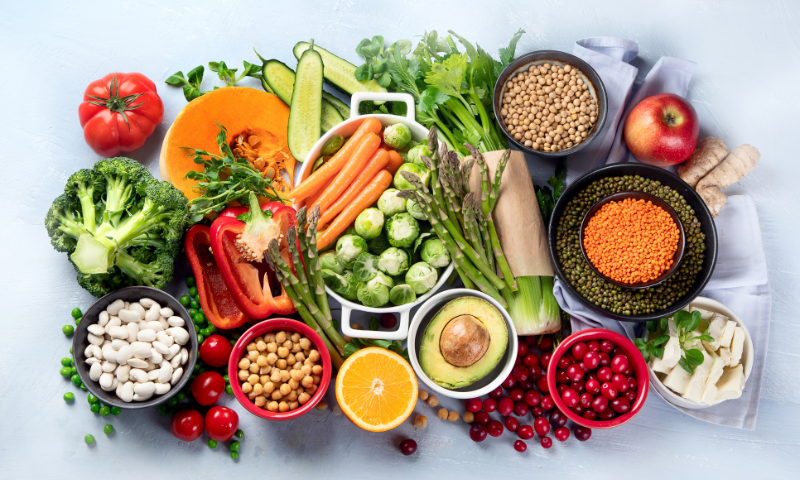March is National Nutrition Month, a campaign created by the Academy of Nutrition and Dietetics. The month is dedicated to bringing attention to the importance of making informed food choices and developing sound eating habits, and promotes nutrition education and awareness.
Here are 10 science-based nutrition tips, from a registered dietitian that are easy to follow and embody proven principles of good health and nutrition:
1 – Eat a Variety of Foods:
Aim for a colorful plate with different types of fruits and vegetables to ensure that you get a wide range of essential vitamins, minerals and antioxidants.
- Include different colors of fruits and vegetables in each meal.
- Try a new fruit or veggie each week to mix things up.
- Keep pre-cut fruits and veggies handy for quick and healthy snacks.
2 – Monitor Portion Sizes:
Use measuring cups or a scale to get familiar with standard portion sizes. Overeating, even healthy foods, can contribute to weight gain.
- Use smaller plates to control portion sizes visually.
- Pause between bites to check if you’re full.
- Share a dish when dining out to avoid oversized portions.
3 – Choose Whole Grains:
Swap out white bread and pasta for whole wheat options. Whole grains offer more nutrients, such as fiber, which helps with digestion and can help to prevent heart disease.
- Look for “whole grain” or “whole wheat” on food labels.
- Experiment with different whole grains like quinoa, brown rice or barley.
- Start your day with whole grain cereals or oats for a nutritious breakfast.
4 – Limit Added Sugars:
Reduce the intake of sweets and sugary drinks. Excessive sugar consumption can lead to obesity, type 2 diabetes and cardiovascular disease.
- Swap sugary drinks for infused water or herbal tea.
- Choose whole fruits for a naturally sweet alternative to desserts.
- Read labels for hidden sugars in packaged foods like sauces and dressings.
5 – Stay Hydrated:
Drink plenty of water throughout the day. The body cannot function properly if not adequately hydrated, and our metabolism can be slowed as a result of dehydration.
- Carry a reusable water bottle with you throughout the day.
- Set reminders to drink water regularly, especially if you’re busy.
- Flavor water with fresh fruits or herbs for a refreshing twist.
6 – Incorporate Lean Proteins:
Opt for lean meats, poultry, fish, beans and legumes. These proteins are healthier for the heart and can help with maintaining muscle mass.
- Plan meatless meals using plant-based proteins like tofu or lentils.
- Grill or roast lean meats for a flavorful and healthy protein source.
- Prepare protein-rich snacks like Greek yogurt or mixed nuts for on-the-go fuel.
7 – Eat More Fish:
Aim to eat fish at least twice a week, particularly fatty fish such as salmon and mackerel which are rich in omega-3 fatty acids.
- Try different cooking methods for fish, like baking or grilling.
- Explore recipes with canned fish like tuna or sardines for convenience.
- Choose sustainable seafood options to support ocean health.
8 – Cut Down on Saturated Fats:
Choose healthier fats found in nuts, seeds, avocados and olive oil, and limit saturated fats found in butter, cheese and red meat.
- Use avocado as a creamy spread instead of butter on toast or sandwiches.
- Snack on a handful of nuts for a satisfying and heart-healthy treat.
- Drizzle olive oil over salads or veggies for a flavorful and nutritious boost.
9 – Be Mindful of Sodium Intake:
Too much sodium can lead to high blood pressure. Check food labels and choose products with lower sodium content.
- Flavor meals with herbs, spices or citrus instead of salt.
- Rinse canned beans or vegetables to reduce sodium content.
- Cook more meals at home to control the amount of salt in your food.
10 – Practice Mindful Eating:
Slow down and enjoy each meal. Being mindful helps you recognize when you’re full and can prevent overeating.
- Put away distractions like phones or screens during meals.
- Chew slowly and savor the flavors and textures of your food.
- Take a moment to express gratitude for your meal before eating.
These tips are designed to provide a solid foundation for nutrition and to support a healthy lifestyle. Each one is grounded in scientific research and is meant to be sustainable over the long term, moving away from fads and quick fixes towards lasting well-being. Celebrate National Nutrition Month by incorporating some of these tips today!
About the Author:
Cassie I. Story, RD, is a Registered Dietitian Nutritionist with 20 years of experience in treating metabolic and bariatric surgery and medical weight loss patients. She spent the first decade of her career as the lead dietitian for a large-volume clinic in Scottsdale, Arizona. For the past 15 years, she has been working with industry partners in order to improve nutrition education within the field. She is a national speaker and published author and enjoys spending time with her two daughters hiking and creating new recipes in the kitchen!






